Coordinators:
Amar Ayyash (US)
Bruce Mactavish (Canada)
Dave Brown (Canada)
Mars Muusse (Netherlands)
smith rings
smith PDF's
smith 1cy August
smith 1cy September
smith 1cy October
smith 1cy November
smith 1cy December
smith 2cy January
smith 2cy February
smith 2cy March
smith 2cy April
smith 2cy May
smith 2cy June
smith 2cy July
smith 2cy August
smith 2cy September
smith 2cy October
smith 2cy November
smith 2cy December
smith 3cy January
smith 3cy February
smith 3cy March
smith 3cy April
smith 3cy May
smith 3cy June
smith 3cy July
smith 3cy August
smith 3cy September
smith 3cy October
smith 3cy November
smith 3cy December
smith sub-ad January
smith sub-ad February
smith sub-ad March
smith sub-ad April
smith sub-ad May
smith sub-ad June
smith sub-ad July
smith sub-ad August
smith sub-ad September
smith sub-ad October
smith sub-ad November
smith sub-ad December
smith ad January
smith ad February
smith ad March
smith ad April
smith ad May
smith ad June
smith ad July
smith ad August
smith ad September
smith ad October
smith ad November
smith ad December
|
American Herring Gull 4cy April
The Peterson Reference Guides
GULLS OF THE AMERICAS
- Steve N.G. Howell / Jon Dunn -
Below is a copy of chapter 25 about American Herring Gull, illustrated with images from this website. "we" in the text below refers to the original authors.
If any errors occur in this text, please let me know and mail to marsmuusseatgmaildotcom.
American Herring Gull (smithsonianus)
PART 1: IDENTIFICATION SUMMARY
PART 2: FIELD IDENTIFICATION - ADULT CYCLE
PART 3: FIELD IDENTIFICATION - FIRST CYCLE
PART 4: FIELD IDENTIFICATION - SECOND & THIRD CYCLE (BELOW)
Second Cycle.
Second-cycle American Herring Gull notoriously variable in appearance; note size and structure, especially of the bill, pale panel on inner primaries, and mostly dark outer primaries; also see hybrid American Herring Gull accounts (pp. 482-485 in Gulls of the Americas).
 |
 |
American Herring Gull 2nd cycle, December 12 2013, Tompkins Co, NY (Kevin McGowan). 2nd gen flight feathers, and most coverts also 2nd gen. Still no grey scaps. Limited partial autumn moult, 3rd gen coverts much 2nd gen-like patterned. |
American Herring Gull (smithsonianus) 2nd cycle, December 08 2012, Lake County, IL (Amar Ayyash). Classic 2nd cycle plumage with pale panel on inner primaries, and mostly dark outer primaries. |
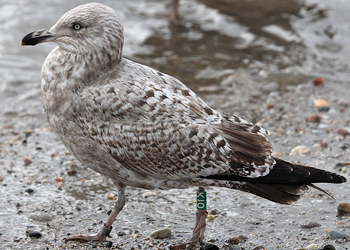 |
 |
American Herring Gull (smithsonianus) 2nd cycle K10 February 22 2013, Circle Beach, CT (Keith Mueller). Banded July 12, 2011. Scapulars are a mix of old brown and new greyish brown feathers, but there is no sign of any grey adult-like feathers. |
American Herring Gull (smithsonianus) 2nd cycle P02 March 05 2012, NH Coast. Picture: Keith Mueller. Banded July 15 2010. Classic 2nd cycle plumage with pale panel on inner primaries, and mostly dark outer primaries. |
THAYER’S GULL can be very similar but averages smaller with a less stout bill, often shows a more rounded forehead. Best plumage feature is paler inner webs of outer primaries – pale inner primary panel on upperwing blends outward into two-tone pattern on outer primaries, unlike more solidly dark outer primaries on Herring; tail often has less-extensive, and browner, dark markings than Herring.
 |
 |
Thayer's Gull 2nd cycle, February 24 2009, Vancouver Island, BC (Guy Monty). Delicately built. 2nd generation primaries, pink base of bill and single grey-based feathers in scapular region. |
Thayer's Gull 2nd cycle, December 08 2012, Lake County, IL (Amar Ayyash). 2nd gen flight feathers, P10 with 'ghost mirror'. Fine vermiculation on the tips of P1-P4. Scapular region almost completely grey, but still intermixed with faint grown feathers. Tail almost completely dark and bill predominantly dark. |
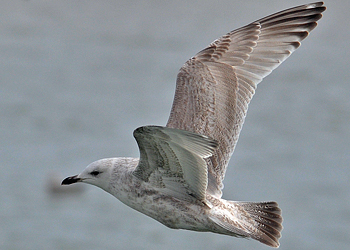 |
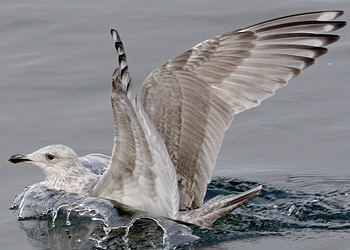 |
Thayer's Gull 2nd cycle, February 16 2013, Lake County, IL (Amar Ayyash). 2nd gen flight feathers, marked dark outerwebs of outermost primaries and already mirror on P10. Tail base not completely dark. |
Thayer's Gull 2nd cycle, November 17 2009, Superior, WI (Erik Bruhnke). Second generation outer primaries already show patterns of mirrors. |
GREAT BLACK-BACKED GULL larger with stouter and more swollen-tipped blackish bill that often has bold creamy tip; tail white with narrower and less solid black distal band; scapulars more variegated, often with some dark slaty gray.
 |
 |
Great Black-backed Gull (marinus) 2nd cycle RUM ES00827010 November 28 2011, Scheveningen, the Netherlands (Mars Muusse). Banded June 18 2010, in Murmansk, Russia (68°N, 37°E). Single fresh scaps show dark upperpart colour of adult plumage. |
Great Black-backed Gull (marinus) 2nd cycle H70T December 15 2012, IJmuiden, The Netherlands (Mars Muusse). Banded in Germany. Powerful bird with some blackish scapulars. 2nd cycle marinus often has P10 mirror. |
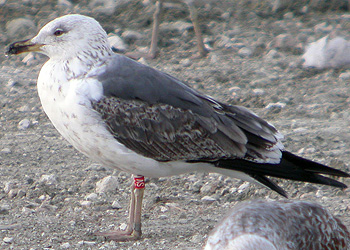 |
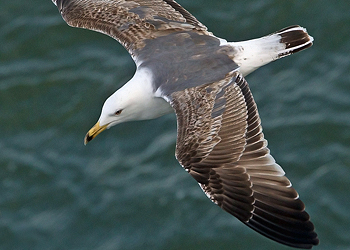
|
Lesser Black-backed Gull (graellsii) 2nd cycle SV March 29 2009, Madrid, Spain (Delfín González).
Banded July 2007 in the Netherlands. Classic "grey saddle". Several wing-coverts and the upper tertials included in the partial autumn moult, now more adult-like than other coverts. |
Lesser Black-backed Gull (graellsii) 2nd cycle, April 28 2012, Belfast, N Ireland (Graham Ekins). Classic "grey saddle". 2nd gen flight feathers, except for one pair of rectrices replaced on winter grounds (now white, 3rd gen). Several wing-coverts and the upper tertials included in the partial autumn moult, now more adult-like than other coverts. |
LESSER BLACK-BACKED GULL slimmer and longer winged; less stout and mostly black bill often boldly tipped creamy upperparts distinctly darker, upperwing lacks contrasting pale panel on inner primaries, tail averages less black, and uppertail coverts whiter overall.
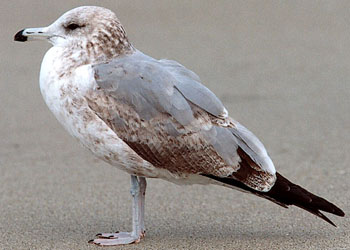 |
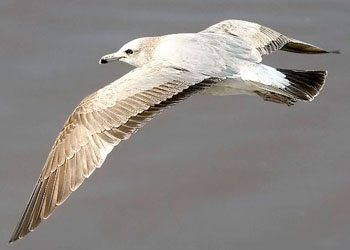 |
California Gull (californicus) 2nd cycle, January 25 2003, Capitola, CA (Jeff Poklen). Classic "grey saddle". 2nd gen flight feathers. Several wing-coverts and the upper tertials included in the partial autumn moult, now more adult-like than other coverts. |
California Gull (californicus) 2nd cycle, November 09 2005, Half Moon Bay, CA (Jeff Poklen). Classic "grey saddle". Several wing-coverts and the upper tertials included in the partial autumn moult, now more adult-like than other coverts. |
CALIFORNIA GULL averages smaller and slimmer with longer wing projection, slimmer and more parallel-edged bill; legs and bill usually with greenish or bluish hues and bill sharply two-toned; eyes dark; pale panel on upperwing smaller (typically on inner 3-4 primaries versus 5-6 on Herring); and gray back feathers darker (Kodak 5-7.5).
VEGA GULL perhaps not always safely separable, but any plain gray on upperparts slightly darker, and tail averages less-extensive black (more like third-cycle American Herring).
WESTERN GULL more thickset with broader wings, stouter and more bulbous-tipped bill, upperparts usually with some to extensive slaty gray, and upperwings lack strongly contrasting pale panel on inner primaries.
 |
 |
Western Gull occidentalis 2nd cycle, November 1985, California (Alex Abela). Note pattern on 2nd gen secondaries. Partial autumn moult included some coverts: GC2-3, MC3, LLC4-7 and few LC, which look fresh and are plain grey. |
Western Gull occidentalis 2nd cycle, February 24 2007, Orange Co (John Avise). Broad-winged. All flight feathers 2nd generation. |
 |
 |
Slaty-backed Gull (schistisagus) 2nd cycle, February 13 2013, Rausu, Japan (Mike Buckland). Pale bird on underparts and head. Fresh scapulars indicate upperpart colour of adult plumage. |
Slaty-backed Gull (schistisagus) 2nd cycle, February 13 2013, Rausu, Japan (Mike Buckland). Pale bird on underparts and head. 2nd gen flight feathers with much dark in tail. Note skirt. |
 |
 |
Slaty-backed Gull (schistisagus) 2nd cycle, February 13 2013, Rausu, Japan (Mike Buckland). Dark bird on underparts and head. Fresh scapulars indicate upperpart colour of adult plumage. 2nd gen flight feathers with much dark in tail. |
Olympic Gull (occidentalis x glaucescens) 2nd cycle, January 02 2012, Gray's Harbor, WA (Amar Ayyash). Bulky bird. Mottled texture as in Glaucous-winged, medium grey tail and primaries as in Western, pale grey upperparts intermediate. |
SLATY-BACKED GULL averages heavier bodied and broader winged. Usually shows some dark slaty gray in the upperparts by late winter, and pale inner webs of outer primaries create a Thayer’s-like pattern.
HYBRID GLAUCOUS-WINGED GULL X WESTERN GULL more thickset with broader wings, stouter and more bulbous-tipped bill, upperparts often with some to extensive medium gray, and dark areas of primaries and tail generally diluted, without a strongly contrasting pale panel on inner primaries.
Third Cycle.
Thayer’s Gull, California Gull, Vega Gull, and hybrids differ in much the same ways as do adults (see above and relevant accounts).
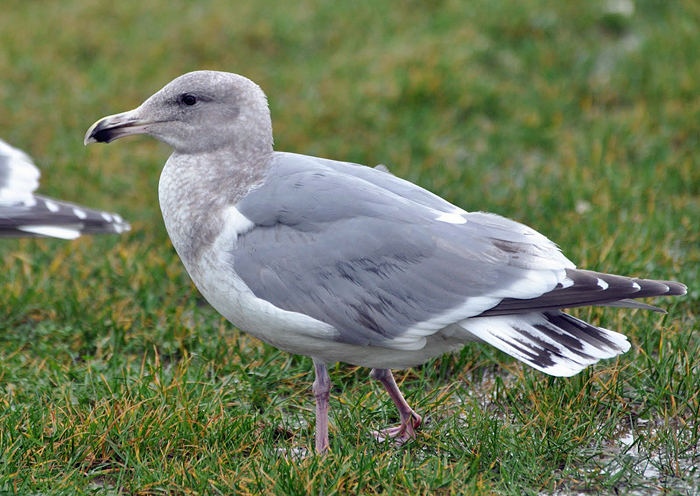 |
Olympic Gull (occidentalis x glaucescens) 3rd cycle, January 02 2012, Gray's Harbor, WA (Amar Ayyash). Bulky bird. Mottled texture as in Glaucous-winged, dark grey in tail and primaries indicate Western influence; pale grey upperparts intermediate. |
CONTINUE PART 5: RARER SPECIES |
East coast birds |
 American Herring Gull (smithsonianus)
American Herring Gull (smithsonianus) American Herring Gull (smithsonianus) P95 3rd cycle (4CY), April 06 2013, Salisbury state beach, Massachusetts. Picture: Steve Arena.
American Herring Gull (smithsonianus) P95 3rd cycle (4CY), April 06 2013, Salisbury state beach, Massachusetts. Picture: Steve Arena. American Herring Gull (smithsonianus) X87 3rd cycle (4CY), April 04 2016, Oyster River, West Haven/Woodmont, CT. Picture: Keith Mueller.
American Herring Gull (smithsonianus) X87 3rd cycle (4CY), April 04 2016, Oyster River, West Haven/Woodmont, CT. Picture: Keith Mueller. American Herring Gull (smithsonianus) Z09 3rd cycle (4CY), April 04 2016, West Haven boat ramp, West Haven, CT. Picture: Keith Mueller.
American Herring Gull (smithsonianus) Z09 3rd cycle (4CY), April 04 2016, West Haven boat ramp, West Haven, CT. Picture: Keith Mueller.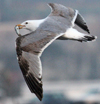 American Herring Gull (smithsonianus) 3rd cycle (4CY), April 17 2012, Gloucester, Massachusetts. Picture: Keith Mueller.
American Herring Gull (smithsonianus) 3rd cycle (4CY), April 17 2012, Gloucester, Massachusetts. Picture: Keith Mueller. American Herring Gull (smithsonianus), 3rd cycle (4CY), April 26 2011, Salisbury, MA. Picture: Suzanne Sullivan.
American Herring Gull (smithsonianus), 3rd cycle (4CY), April 26 2011, Salisbury, MA. Picture: Suzanne Sullivan. American Herring Gull (smithsonianus) sub-adult, April 18 2007, Halifax, Nova Scotia, Canada. Picture: Rwkphotos.
American Herring Gull (smithsonianus) sub-adult, April 18 2007, Halifax, Nova Scotia, Canada. Picture: Rwkphotos. American Herring Gull (smithsonianus) 3rd cycle (4CY), April 06 2013, Presque Isle State Park Erie county PA, USA. Picture: Shawn Collins.
American Herring Gull (smithsonianus) 3rd cycle (4CY), April 06 2013, Presque Isle State Park Erie county PA, USA. Picture: Shawn Collins.

















